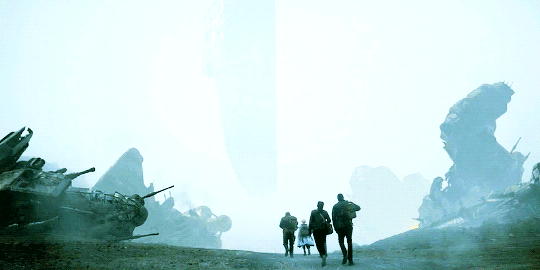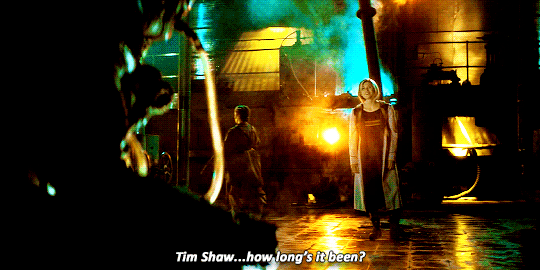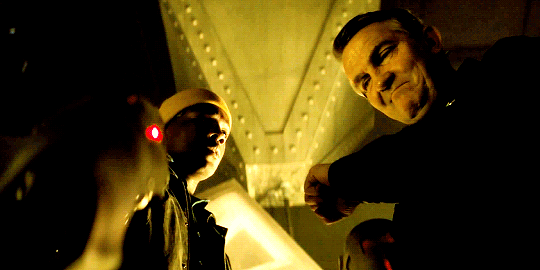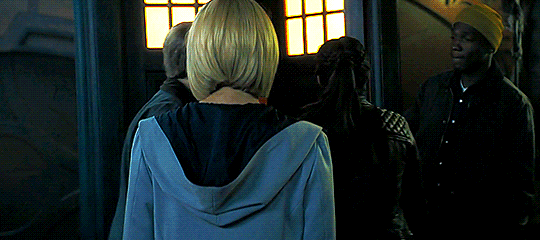Series 11 comes to an end with “The Battle of Ranskoor Av Kolos”. The title would suggest that this finale is an epic conclusion to a season that—for the most part—has been a breath of fresh air. “Epic” is bad word to describe this episode, though. It’s exciting in its own way, at least the concept is. As just another episode, “The Battle” (as I’ll call it from now on) is fine, perhaps even good at times. As a season finale? Underwhelming, to say the least.
We respond to urgent calls
Let’s look at what the episode was actually about. The Doctor and team receive nine different distress calls, all coming from the planet of Ranskoor Av Kolos. What follows is the restoration of Paltraki’s (Mark Addy) memories, the realization that Tim Shaw’s (Samuel Oatley) back, genocide on five counts, some Graham angst, and ultimately the TARDIS saving the day. The big thing here is Tim Shaw, of course, more so than any of the plot points. Series 11 has been very secretive in general and Oatley’s return was meant to be this huge thing the BBC didn’t want to spoil. The irony here is that Tim Shaw’s return was probably the most predictable thing about any series finale in the history of Doctor Who.
But before diving into what Tim Shaw contributed to the finale, let’s talk a bit more about the setup. So we have the nine distress calls, Paltraki mysteriously not remembering anything, the whole thing about the planet messing with people’s heads. This is a suspenseful beginning and it looked like it would set up a real threat, something worthy of a final episode. And then… it falls flat. When Tim Shaw appears, the episode wants you to feel like as if the stakes have been raised. What happened to him since the Doctor defeated him 3,407 years ago? What has he been up to? All kinds of questions that we could think of as the Doctor herself tries to figure it all out. The problem is? I don’t particularly care.
The “revelation” of Tim Shaw comes eight minutes into the episode. Those first eight minutes were setting up something big and then Tim Shaw appears and the tension is gone from that point. It’s not like Chibnall doesn’t try to make you care: Graham’s storyline, if nothing else, should make you feel invested in whatever will happen. If you’re like me, though, then that’s not enough to turn the episode around. Don’t get me wrong, it’s not like Tim Shaw is the only aspect of “The Battle” or that I’m saying he ruined it all. It’s that the episode itself puts so much emphasis on this him without putting the work in to build him up as a real threat.

Tim Shaw? Is that you?
Okay, fine, let’s talk about Tim Shaw himself then. Most of the episode’s tension comes from his return. Graham’s desire for revenge, the Ux’s faith being twisted, Paltraki’s crew, everything. “The Battle” takes it for granted that you fear Tim Shaw as much as everyone else and that you care about tension because of him. Essentially, Chibnall counts on his own episode, “The Woman Who Fell to Earth” as having established this villain as a real threat. Unfortunately for him, that episode didn’t do an amazing job at setting up Tim Shaw, either. Back then, he was an alright monster of the week who caused the fridging of Grace and brought Team TARDIS together. Now that he’s back, the most significant aspect of him is still how he relates to the main characters.
Suppose that he was more impressive in that first episode, that we as an audience actually cared about him being back. “The Battle’s” handling of him would still be disappointing. For all his talk about the greatness of the Stenza and even despite his five goes at genocide (with Earth being the sixth attempt), Tim Shaw doesn’t feel threatening. The camera certainly tries to convey the message, there’s nothing wrong Oatley’s acting, either. You don’t even have time to process the weight of his threat, really. I’d need to rewatch both that first episode and this one, but right now I feel like the problem is with the pacing and how the Doctor views him.
Remember, Tim Shaw’s relevance lies in how he relates to Team TARDIS. He’s a villain because he killed people in Sheffield, most importantly causing the death of Grace, and he’s the catalyst for the team coming together. Yaz and Ryan barely react to him, with the exception of Ryan helping Graham take him down. That leaves the Doctor and Graham, it’s up to them to make us care about Tim Shaw being back. I’ll get back to Graham, but how does the Doctor react? She’s annoyed by him. Even when she realizes the genocide and the massive scale of his actions, she’s more annoyed than anything.
Part of it is just how the Thirteenth Doctor is as a character. She doesn’t go full Oncoming Storm on him or gives an epic speech as other Doctor’s might have done. She refuses to take him seriously and therefore takes away his power. And this is a refreshing and good trait for the Doctor to have in general, but maybe, in this case, we could have used something else. The Doctor is still appalled by Tim Shaw’s actions and sure, there is at least some weight to the possibility of Earth being miniaturised and kept as a trophy. But the Doctor’s mostly annoyed with Tim Shaw and frankly, so am I.

“Every action has consequences.”
“And these are yours, Doctor.”
So, Tim Shaw failed to make me invested in what was happening. Even Earth being targeted feels empty. Okay, Yaz is understandably worried about her planet and as is the Doctor. But do we really care about the Earth of the 55th century? And Yaz sacrificing her neural balancer if that means saving Earth is all nice and good, but nothing bar a mild headache happens to her and the Doctor as a result. Hard to get a sense of the stakes, despite the Doctor’s rambling, if nothing really happens to anyone. Okay, okay, the five planets that Tim Shaw already got to. The battlefield on the planet. Paltraki’s crew member dying. “The Battle” sure does want me to care about all this but it doesn’t do an awful lot to achieve that.
Tim Shaw wants the Doctor to face the consequences of her actions and so he targets Earth. It’s a good concept on paper, and the above exchange between the Doctor and Tim Shaw could have gone done as one of the more interesting ones in Doctor Who history. I don’t want to blame Tim Shaw’s character for everything so here’s another way in which this falls flat: it’s empty words, no matter who says it. There are no consequences for the Doctor’s actions, and arguably that’s because Tim Shaw barely had anything to blame on the Doctor.
The Doctor’s action, in this case, was to send Tim Shaw back. He ended up on Ranskoor Av Kolos instead and there’s an argument to be made that, as a consequence, the five genocides and atrocities committed are all her fault. In this case, the Doctor’s real mistake was to let Tim Shaw live. This is never discussed, it’s just taken for granted that the Doctor stopped him once and has to do so again. In the end, it’s Graham and Ryan who seal him away and the Doctor herself doesn’t seem too worried that Tim Shaw might rise and kill again.
What’s the consequence here? The Doctor doesn’t let Tim Shaw get to her head and doesn’t take on the guilt of all those deaths. That in itself is actually a brilliant way of showing how far the Doctor has come since the Time War and how Thirteen is willing to let that all go. Or could have been, if even the possibility of the Doctor internalizing this was brought up.
It’s not that genocide and war can’t be bad without it having a direct effect on the main cast. Yes, Tim Shaw is undoubtedly bad and what happened with the Ux and the planet is sad. The problem is that there could have been a personal side to the story, but without the Doctor’s reflections or any other consequences regarding the companions, we just have this. Yes, it’s bad and sad but it lacks any nuance or complexity beyond that. And even the fact that it’s bad and sad doesn’t have time to sink in because the episode is desperate to get to the conclusion by the time we find out about this.
The better man
But wait, there is one main character who reacts to Tim Shaw beyond the initial shock or annoyance. Graham, fresh off seeing Grace again in “It Takes You Away”, is out to avenge the death of his wife. The Doctor’s immediate reaction is to send Graham back to the TARDIS but he ignores her. The way the dialogue plays out is strange in itself but let’s not get hung up on that. So Graham’s out for blood and the Doctor makes it clear that she won’t stand for that. It’s ultimately not her but Ryan who convinces Graham that Tim Shaw is not worth it, that Grace wouldn’t have wanted that.
This Graham side of “The Battle” is the one I appreciate the most and have the least problems with. Okay, so his change of heart was quite sudden and as was his bloodlust, to be honest, but it works with development that he has with Ryan. I especially appreciated Ryan saying “I love you” and looking like he regretted it immediately. They are allowed to have heartfelt moments but it’s never “cheesy” or cheap. The two take down Tim Shaw together and make him think about Grace and the consequences of his actions.

The lack of a battle on Ranskoor Av Kolos
The thing with Graham’s desire for revenge is that even this storyline would have been so much better if it had more time to progress. That is ultimately the main problem with “The Battle”: time. This is typically a story that would have been a two-parter in any other season and not just because it’s a finale episode. Chibnall’s pacing and his resolutions, in particular, have had problems but in “The Battle” it makes the whole story not work.
Or rather, it still works, it just misses almost every chance it gets to become something more, something spectacular. There isn’t even a battle, as such, even though it’s in the title of the episode. There have probably been many battles on this planet, just not any that Team TARDIS participated in. So what do we have instead? The stopping of Tim Shaw in an underwhelming finale. At the very least, “The Battle” is underwhelming when viewed as a season finale, far more low-key than any other from the 11 series of New Who so far. But that poses an interesting question: do we need season finales to be epic?
This topic warrants its own article but in case we had a short “no” answer, where would that leave us with “The Battle”? Is it a better episode when it’s freed from the pressure of having to be a grandiose conclusion to a whole season filled with various themes and storylines? Well, my short answer would be “slightly”. Yes, it’s slightly better when you take that expectation out of the picture. But it doesn’t change the fact that the episode still thinks too highly of itself and fails to be remarkable in almost every way. At the end of the day, it would still need to be a two-parter to be a better version of itself. Or maybe it would need a different writer altogether, depending on how you view Chibnall.
Closing thoughts
I’m aware that I’m being harsh with “The Battle”, possibly because of its season finale status. And though I stand by my criticism, let’s point out some of the better parts of this episode. Despite everything I just said I don’t hate this episode or even dislike it too much. It has way too many flaws for me to think it’s “good”, but there are still some highlights.
I haven’t mentioned the Ux much but I think their concept was interesting. Perhaps in another context, the Doctor could have spent more time getting to know them and being amazed by their powers and culture. As I said, the Graham and Ryan scenes were a worthy end for their relationship in series 11 and they are both loveable dorks. Mark Addy’s Paltraki was underused but he was still a welcome addition to the list of guest stars. Yaz had a disappointingly small role but she still managed to have her moments, especially when paired with the Doctor. And I’ll say it one last time this year: Jodie Whittaker is still amazing and does the best she can with the script she’s given.

“And it has to be us, does it?” Graham asks the Doctor at the beginning of “The Battle of Ranskoor Av Kolos”. And the answer is no, it didn’t have to be them to answer those distress calls, we would have been fine without this episode. But it’s still more Doctor Who with Thirteen and I still got some joy out of watching the episode, so underwhelming or not, here we have the end of series 11.
Fortunately, there is going to be one more episode before the hiatus until series 12 in 2020. The holiday special will air on New Year’s Day this year and perhaps it will do a better job of concluding this first part of Thirteen’s run. “Resolution” is rumoured to feature an old monster so this could be Chibnall’s first attempt at writing a returning foe (during his own era, anyway). It could be anyone or anything… oh, who are we kidding, it’s gonna be the Daleks.

